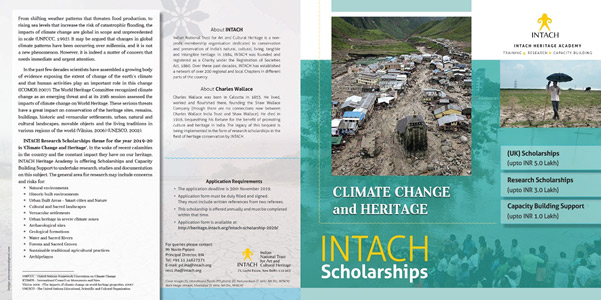Research Scholarships
INTACH AWARDS
INTACH Journal of Heritage Studies
INTACH Research Scholarship 2020
INTACH Research Scholarship 2020-21
The Research Scholarship Selection committee meeting was held in the month of February 2020. Despite the difficult situations arising due to the pandemic, the scholarships were awarded to the selected candidates post thorough review of their framework and methodology to conduct research in the Covid times. A total of 11 scholars were selected for the Research Scholarship programme – 1 in the UK Scholarship category, 8 in the Research Scholarship category and 2 in the Capacity Building Support category. The UK Scholarship was deferred to next year due to the current pandemic situation. It is commendable at the outset that the scholars are devising new ways to conduct their research work in these times of difficulty facing the brunt of travel restrictions and limited resources. For this particular year, the Research Scholarship applications were invited for a theme – ‘Climate Change and Heritage.’

From shifting weather patterns that threaten food production, to rising sea levels that increase the risk of catastrophic flooding, the impacts of climate change are global in scope and unprecedented in scale (UNFCCC, 1992).
It may be argued that changes in global climate patterns have been occurring over millennia, and it is not a new phenomenon. However, it is a matter of concern that needs immediate and urgent attention. In the past few decades, scientists have assembled a growing body of evidence exposing the extent of change of the earth’s climate and that human activities play an important role in this change (ICOMOS 2007).
The UNESCO World Heritage Committee recognized climate change as an emerging threat and at its 29th session assessed the impacts of climate change on World Heritage. These serious threats have a great impact on conservation of the heritage sites, remains, buildings, historic and vernacular settlements, urban, natural and cultural landscapes, movable objects and the living traditions in various regions of the world (Vilnius, 2006) (UNESCO, 2002).
Taking note of the concerns, mentioned above by some of the key cultural and heritage organisations, and in the wake of recent calamities in the country and the constant impact they have on our heritage, INTACH Heritage Academy offered opportunities for research on the them – Heritage and Climate Change. A suite of scholarships and capacity building support is available to undertake research, studies and scientific assessment on this subject. A broad area of research includes:
- Natural environments
- Historic built environments
- Urban areas – smart cities
- Cultural and sacred landscapes
- Vernacular settlements
- Urban heritage in severe climate zones
- Archaeological sites
- Geological formations
- Water and Sacred Rivers
- Forests and Sacred Groves
- Sustainable traditional agricultural practices
- Archipelagos
Out of several applications received for consideration under the research theme, ten have been awarded the research scholarship. The following section provides a brief overview of the issues and challenges that the selected research scholarships will be addressing over a period of one year.

Mr Aditya Jain is a Conservation Architect based in Ahmedabad. His work profile includes design and development of tools for heritage risk assessment and developing training needs assessment in the context of Climate Change adaptation and risk reduction in Orissa with All India Disaster Mitigation Institute. He is currently an Assistant Professor at INDUS University.

The research on Traditional water structures and impact of climate change: a case of stepped kunds in Gujarat, undertaken by Mr Aditya Jain aims to establish the relevance and importance of traditional water structures, and to document the traditional water harvesting structures with a focus on the kunds. The western region of India comprising of the States of Gujarat and Rajasthan is predominantly a rain deficit region, and hence many traditional water structures which were used to harvest the ground water can be found here. The entire region is dotted with numerous stepwells and kunds, placed along trade routes or along with monument clusters. They served utilitarian purpose as well as cultural and social purpose. These water structures are an essential part of daily life and also a part of the cultural beliefs of the people.

The research aims to understand the systems of these natural aquifers and water bodies and to analyse the change in pattern of water harvesting systems in the particular region. The study explores the sites all over Gujarat, and establishes their relevance in varying climatic and geographical conditions.
The research intends to consider the impacts of climate change on these structures with an objective to conserve them as a resource to reduce the risks arising from climate change. The research builds around the know-how of water harvesting possibilities and to analyse the impact of climate change on the catchment area of a water body. It also seeks to utilize the traditional water management system as a tool to mitigate climate change risks

Ms Foram Bhatt is a Conservation Architect based in Ahmedabad. She has her own practicing firm CREDO Architects. She has previously worked as a Research Associate in Centre for Planning and Technology in Ahmedabad. She has worked on the nomination dossier for the World Heritage City of Ahmedabad, Gujarat.

An interesting research on the Impact of climate change on vernacular settlements – study and documentation of village Nirmand, Himachal Pradesh undertaken by Ms Foram Bhatt highlights the impacts of climate change on indigenous hill settlements in a rural context. The indigenous inhabitants of traditional neighbourhoods have evolved with changing parameters over a period of time. Their knowledge and wisdom have passed on from one generation to the next since many years.
It is important to understand the ecological system of these indigenous settlements in order to appreciate how the approaches and methods have withstood the shifts and situations in the past and survived through natural calamities and disasters. The research focuses on the factors of climate change that impact the various complex layers of indigenous ways of life. The study is substantiated by recording and documenting the indigenous resilience systems.

Ms Sarmistha Chatterjee is a Conservation Architect based in Manipal. Currently an Associate professor at Manipal University, Karnataka, Sarmistha has done her M. Arch from SPA Delhi. She was a former Conservation Architect with INTACH Delhi Chapter.
Trivikram TN, is an Architect, Urban Designer by profession, and is presently working as an Associate professor at MSAP, MAHE, Manipal. He has an experience of over ten years in the field of academics and field work together. He has worked on heritage projects and Urban Conservation projects as a junior Architect in Kshetra Architects, Hyderabad and had a brief stint with GHMC (Greater Hyderabad Municipal Corporation) as a consultant in Traffic and Transportation wing, he also worked as a freelance consultant with various firms on multiple urban design projects.
A research on the subject: Effect and impact of changing climate trends on built heritage of Madikeri, is co-authored by Ms Sarmistha Chatterjee and Mr Trivikram TN. The study shares the findings and contextual guidelines for mapping and assessing the heritage in fragile ecological environments of Madikeri in Karnataka State. The research is based on the assessment of the cultural landscape of Madikeri and identifying a potential ‘heritage precinct’ with its natural and built heritage. A critical assessment of damages caused due to climatic changes, natural disasters and man-made interventions will eventually lead to preparing a set of guidelines for the prevention of future damages from climatic changes in a similar context.

An Urban Designer by profession, Ms Minal Sagare is an Associate Professor with Padmbhushan Dr. Vasantdada Patil College of Architecture PVPCOA in Pune. She has previously worked with Narendra Dengle and Associates and has also been a part of the Academics with Sinhagad College of Architecture
A matrix of main island, multiple chaporis (islets), river Brahmaputra, its tributaries – Subansiri river in the north and its anabranch – Kherkutia Xuti on northwest, multiple inland river channels and beels (wetlands), Majuli is a riverine island in river Brahmaputra in the State of Assam. Inspite of this ever-changing character of the island, it has been a homeland for multiple ethnic communities like the Mising, Deoris, Sonowal Kacharis, etc.

Ms Minal Sagare’s research on Climate change and learnings from the traditional land water practices of Majuli Island, Assam is a significant work in the domain of climate change. It involves deep exploration of land-water practices in terms of traditional livelihood patterns associated with water, in terms of land-water use as against just the land use, as reflected in their creation, distribution, ownership and their management practices, traditionally. It involves identifying the threads of climate change to traditional land-water practices and providing the strategies for their mitigation with relevance to traditional settlement patterns.

Ms SK Aathirai is a Conservation Architect. She has worked as a Site Architect in for Abha Narain Lambah in the South zone. She is current working as an Assistant Professor in Mohamed Sathak AJ Academy of Architecture
According to a published article, coastal cities face a grave risk of being submerged in the next three decades. We need better strategies to save the cities. Amidst these risks,
Ms S K Aathirai’s research on Climate change impact on historic structures of Coramandal Coast – in case of Masilamanindhar Temple, Tranquebar promises to be significant.
The research covers the documentation of the temple, both the old and new, elaborating on the impacts on the structure through condition assessment studies. It focuses on the changes to the coast and its effect on the temple structure, and illustrates parameters for measuring the impact of climate change on the structure.


Ms Sreeja K Gopalan is PhD in Agricultural Systems and Management, Agro-ecology and Social anthropology. She is a Co-investigator in the Project Kerala floods – Enquiry into causes and Risk Mitigation Strategy at the Lal Bahadur Shastri National Academy of Administration (LBSNAA). Previously she has worked as a Post-doctoral fellow at the Indian institute of Bombay on Landuse and climate change impacts on the agricultural systems in the Western ghats.

Ms Sreeja Gopalan’s research on Living by the sea: natural and cultural seascape in a changing climate – a study set in the fishing harbour town of Munambam on the Malabar Coast is another subject focusing on the climate change impacts on coastal heritage and livelihoods.
Apart from documenting the extensive indigenous knowledge about the ocean and its climate, the research explores the physical and cultural changes to a way of life and the extent to which the newer science-based warnings are integrated/ colliding with the traditional wisdom and practices. The study focuses on understanding the changes to the natural environment of the sea (wind/current/dial/patterns) and to fishing in a warming sea as perceived by the fishermen. It explores the changes to the coast and living in an ancient harbour town by a rising sea.


Mr Sumesh Dudani is a Post-doctoral fellow at the CSIR, Council of Scientific & Industrial Research – National Botanical Research Fellow at Lucknow. A doctorate from IISC Indian Institute of Science Bangalore, Sumesh is currently as Project Consultant.

The cultural and historical monuments/ structures are important elements of heritage across the globe. However, they are continuously subjected to various effects of surrounding environmental conditions, particularly the impacts of biological organisms growing on and around these monuments. These impacts are often influenced by climate change factors such as enhanced temperatures, fluctuating rainfall and increased air pollution, especially with higher emissions of carbon monoxide, sulphur dioxide, nitrogen dioxide and particulate matters. Mr Sumesh Dudani’s research is based on the Biodeterioration studies on heritage structures in Delhi. The study discusses the effects of climate change in the overall floristic diversity of heritage structures and its impact on the biodeterioration. It involves establishing an important link in the formulation of conservation strategies for heritage structures and their associated microflora. A study by Caneva et al. (1995) highlights that favourable microclimatic conditions dramatically increases the survival of biological species on xeric substrates such as the stone monuments. The study intends to understand the role of different plant groups in modifying the environmental factors and physical characters of the heritage structures in the context of Delhi.

A recent graduate in Architecture and heritage enthusiast, Ms Anjali Sreekumar is a practicing architect in Kerala. Anjali has previously worked in Kerala over design and urban scale projects.

Ms Anjali Sreekumar’s research on the topic of Socio-economic aspect of temple sacred groves in the wake of climate change discusses that, though every sacred grove is unique and indispensable part of that society, rich in its biodiversity. Every sacred grove has a very unique myth and belief associated to it and it is very important to address and to document these in this age of globalization and commercialization. Due to various social reformations most of the sacred groves are in either on the verge of extinction or already extinct. Today only a few have stood the test of time, which still uphold the core essence and is solely due to the strong religious beliefs they uphold it. Anjali’s research, set to explore the sacred groves of North Malabar in Kerala, intends to establish the need and importance of sacred groves which is essential for the balanced development of all living and non-living entities.
The main aim of the research is to document the natural and cultural heritage of the place and further analyse them climatically and socio-economically to establish the significance of sacred groves in our present context. The research outcomes include preparation of assessment parameters to value and conduct the ecological economic analysis based on the value and cost benefit analysis thereby establishing the significance and need of conservation for the site which would include preparing guidelines on social, physical and policy level.

Currently practicing and working in the field of Architecture, Mr Arijit Chatterjee has completed his M. Arch in Masters in Architecture and Design specializing in Maritime and Nautical Design, Escuela de Arquitectura y Diseño, e(ad)- PUCV, Valparaiso, Chile.

In Kolkata, a network of canals collects the city’s sewage and channels it into one of the largest and most productive treatment systems in the world – the East Calcutta Wetlands (ECW). Through filtration, the wetlands work as kidneys for the city and are arguably the world’s only fully functional organic sewage management system.
Mr Arijit Chatterjee, through his research titled: Kidneys of Kolkata – the East Calcutta Wetlands as critical infrastructure defines the term ‘critical infrastructure’ owing its origin to observations in Western Patagonia, mining towns in the Atacama Desert. The study discusses the concept of ‘critical infrastructure’ in the climate change context connecting the disciplines of landscape urbanism, policy making architecture and environmental engineering. The study will develop a Masterplan as a playful, adaptive of ideas – How information can be illustrated to be useful in projecting scenarios for the future in the era of climate change and rapid urbanization.


Ms Sneha Kishnadwala is a Conservation Architect based in Delhi. She completed her Masters in Architectural Design for the conservation of the Built Heritage from University of Strathclyde, UK. She is currently working as a Capacity Building Assistant at INTACH Heritage Academy and is also a visiting faculty at the Kamla Raheja Vidyanidhi Institute of Architecture (KRVIA)

Ms Sneha Kishnadwala’s study on Climate Risk Assessment for World Heritage Site: Victorian Gothic and Art Deco and Ensembles of Mumbai is quite an interesting topic. Set in the basic premise of climate risk assessment for World Heritage Sites, there have been very few cases discussed in this direction and context.
The research outcomes involve understanding risks due to environmental threats/ hazards, that may cause damage to the cultural significance of the site. Identifying and conducting a climate risk assessment includes a range of climate threats to the Victorian Gothic and Art Deco and Ensembles of Mumbai. The study will help in identifying the key buildings and areas that may be affected by these risks. It presents methods for the assessment of these risks and suggests appropriate mitigating actions

- United Nations Framework Convention on Climate Change Unfccc.int. 1992. [online] Available at: ICOMOS International Workshop on Impact of Climate Change on Cultural Heritage New Delhi Icomos.org. 2007. [online] Available at:
- Climate Change and World Heritage Report on predicting and managing the impacts of climate change on World Heritage and Strategy to assist States Parties to implement appropriate management responses, 2006)
- 2006. Climate Change And World Heritage Report On Predicting And Managing The Impacts Of Climate Change On World Heritage And Strategy To Assist States Parties To Implement Appropriate Management Responses. [online] Vilnius: UNESCO World Heritage Centre. Available at: [Accessed 29 September 2020].
- Caneva, Giulia & Gori, Enrico & Montefinale, Tito. (1995). Biodeterioration of monuments in relation to climatic changes in Rome between 19–20th centuries. Science of The Total Environment – SCI TOTAL ENVIR. 167. 205-214. 10.1016/0048-9697(95)04581-K.


















